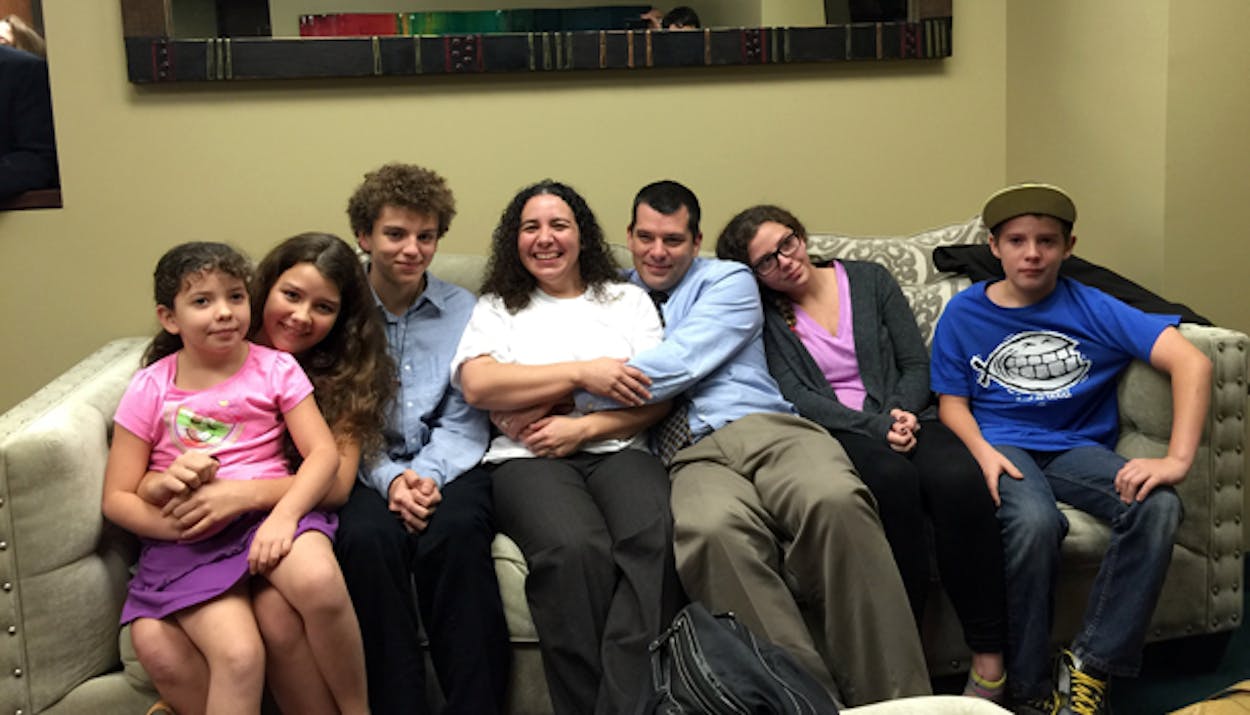Tonight, Hannah Overton—whose case has been chronicled extensively in Texas Monthly—walked free after serving seven years of the life sentence that she was handed by a Corpus Christi jury in 2007.
Hannah was arrested in 2006 after Andrew Burd—a four-year-old foster child whom she and her husband were in the process of adopting—mysteriously died of a rare case of “salt poisoning.” Hannah, who had no previous run-ins with CPS, no prior arrests, and no history of violence, was charged with capital murder. Prosecutors painted a macabre portrait, arguing that she snapped under the demands of parenting and force-fed Andrew a lethal amount of salt. After a sensational trial, she was convicted and sentenced to life in prison without the possibility of parole.
In an article I wrote in 2012, I explored the many inconsistencies in the state’s case. Prosecutors never explained how Hannah—who was six months pregnant and recovering from whiplash at the time—managed to overpower Andrew and force-feed him a large quantity of salt. They discounted evidence suggesting that Andrew had an undiagnosed eating disorder not uncommon among foster children called “pica,” which involves consuming inappropriate items, including salt. And they never established a plausible motive—if Hannah was so overwhelmed by the demands of parenting Andrew, why didn’t she simply terminate the adoption process?
The many problems in Hannah’s case were also investigated by her appellate attorney, Cynthia Orr, who asked that the Court of Criminal Appeals re-examine Hannah’s claims of innocence. Orr’s tenacity prevailed; in February 2012, the CCA ordered that an evidentiary hearing be held in Corpus Christi. The dramatic, six-day hearing that followed that April laid bare the many flaws in the state’s case and suggested that Hannah’s conviction rested on both bad lawyering and bad science. Orr went on to present her case to the CCA’s nine justices this spring, and in September, the court overturned Hannah’s conviction, finding that her attorneys did not do an adequate job of defending her at trial.
Today, Hannah’s new legal team made the most of what was supposed to be a straightforward bond hearing, putting on numerous witnesses—including three pastors and a man whose severely disabled son Hannah had once ably cared for—who testified that Hannah was a person of good character who could be trusted around children. (She is currently represented by Orr and Gerry Goldstein of San Antonio’s Goldstein, Goldstein & Hilley, and John Raley of the Houston firm Raley & Bowick.)
Arguably the most dramatic moment of the hearing came when Hannah’s attorneys revealed that one of the state’s star witnesses at trial, Dr. Alexandre Rotta—who had treated Andrew on the night he was brought to the hospital in 2006 in a coma—had recently contacted Hannah’s defense team. Dr. Rotta told Hannah’s attorneys in an email that seven years after Hannah’s trial, her conviction still kept him up at night. This complicates matters for Nueces County District Attorney Mark Skurka, who has vowed to retry Hannah on capital murder charges. The fact that key prosecution witnesses such as Dr. Rotta—along with Dr. Edgar Cortes, another physician who examined Andrew on the night he was admitted to the hospital—now question Hannah’s conviction casts doubt on whether Skurka can win his case again.
The state countered by putting Robert Rosetti, a child safety specialist at CPS, on the stand. He cautioned that Hannah had been required to have “supervised access” to her children when she was last released on bond while awaiting her 2007 trial, because CPS felt she posed a risk to her children.
At the conclusion of the hearing, visiting district judge Mario Ramirez Jr., of Edinburg, set bail at $50,000—which members of Hannah’s church, Calvary Chapel of the Coastlands, immediately posted.
Shortly before six o’clock, Hannah shared a reunion with her husband, Larry, and their five children. Isaac, the oldest, is now fifteen. Isabelle, Ally, and Sebastian are thirteen, twelve, and eleven, respectively. The youngest, Emma—who was still a baby when Hannah was sent to prison—is now eight.
The Overtons will have to wait and see whether the Nueces County DA’s office will, in fact, retry Hannah. But as Orr told me earlier this fall, “I’ve got more surprises for them if they want to try to take this to trial.”
- More About:
- Politics & Policy
- Hannah Overton







